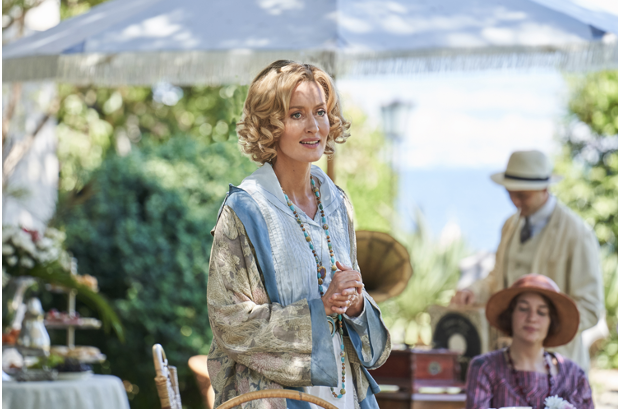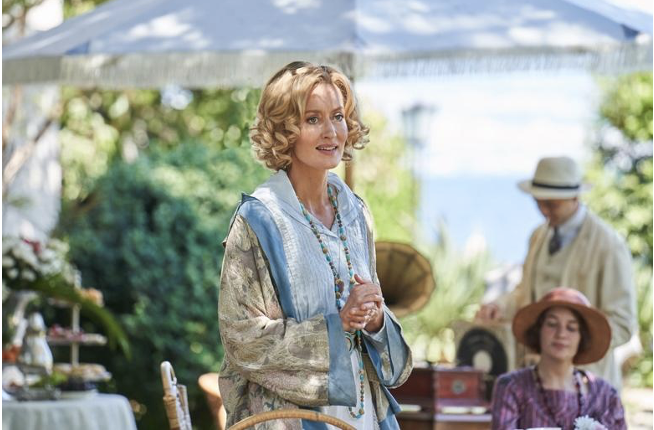Glamorous Period Drama Launching Exclusively on all PBS Platforms June 19

ARLINGTON, VA — This June, the drama-filled series HOTEL PORTOFINO, which has charming characters from different walks of life mingling in an exhilarating cocktail of romance, glamour and mystery, will launch on all PBS platforms. The six-episode period piece starring Natascha McElhone (“Ronin,” “Californication,” “Halo”) follows an elite yet dysfunctional British family who open a hotel for upper-class travelers on the magical Italian Riviera during the Roaring ‘20s.
Caption: Bella Ainsworth (Natascha McElhorne)
Credit: Courtesy of © Eagle Eye Drama Limited 2021
HOTEL PORTOFINO premieres Sunday, June 19, 8:00-9:00 p.m. ET on PBS (check local listings) and will be available to stream on all station-branded PBS platforms including PBS.org, the PBS Video app, available on iOS, Android, Roku streaming devices, Apple TV, Android TV, Amazon Fire TV, Samsung Smart TV, Chromecast and VIZIO. HOTEL PORTOFINO will be available to stream on PBS Passport and the PBS MASTERPIECE Prime Video Channel.
HOTEL PORTOFINO tells the story of the Ainsworth family that has relocated from Britain to open an upscale hotel on the Italian coastline. Set in the breathtakingly beautiful resort town of Portofino, this new period drama is about personal awakening at a time of global upheaval in the traumatic aftermath of World War I and the liberating influence of Italy’s enchanting culture, climate and cuisine on elite British travelers. As distinguished guests like the imperious Lady Latchmere check into the hotel, matriarch Bella Ainsworth tries to keep up with their constant demands. McElhone and Mark Umbers (“Home Fires”) star as the British expat hoteliers Bella and Cecil Ainsworth.
Rounding out the ensemble cast, are Anna Chancellor (“Four Weddings and a Funeral”), Pasquale Esposito (“Gomorrah”), Oliver Dench (“Pandora”), Assad Zaman (“Apple Tree Yard”), Adam James (“Doctor Foster”), Imogen King (“The Bay”), Elizabeth Carling (“Goodnight Sweetheart”), Olivia Morris (“The Turtles”), Lily Frazer (“Saint Maude”), among others.
Embracing intertwined sexual and social liberation themes, HOTEL PORTOFINO delivers addictive plotlines for drama lovers in a breathtaking Italian setting.
Episode One: “First Impressions”
Hotel Portofino opens its doors to guests around the world, including the imperious Lady Latchmere (Chancellor) who is hard to please. Bella Ainsworth (McElhone), co-proprietor with her husband Cecil (Umbers) and the moving spirit behind the hotel, uses resources, energy and focus to meet hotel demands, while tending to her war-wounded son Lucian (Dench) and her widowed daughter Alice (Morris). Bella quickly finds herself targeted by a scheming local politician, Signor Danioni (Esposito), who threatens her with extortion.
Episode Two: “Lessons”
Guests settle in and enjoy the hotel property, including the vivacious American, Claudine Pascal (Frazer), and Anish Sengupta (Zaman), a close friend of Lucian’s who is taking a break from his medical studies. Under the pressure of an arranged marriage to Rose by his father Cecil, Lucian asks for permission from her mother Julia to take her for a painting lesson on the beach. Meanwhile, Danioni worms his way into the Ainsworth’s affairs by helping Cecil arrange for a family heirloom to be sent from England.
Episode Three: “Invitations”
Bella and Lady Latchmere bond over a family tragedy and Constance, a young woman helping around the hotel, is encouraged to make more of her appearance by the hotel’s most worldly guest, Claudine. Bella invites Italian locals to the first English afternoon tea in the hotel’s garden, and the Ainsworth heirloom, a painting by the artist Rubens, arrives during the festivities. When several guests head off for a supper party, Lucian and other younger guests stay behind. Rose lets her hair down with Lucian but disgraces herself in Julia’s eyes.
Episode Four: “Uncoverings”
The younger guests venture out on a boat trip, where Constance wears the daring swimsuit Claudine has given her. Catching Lucian’s eye, he and Constance swim together to explore a nearby cave. Bella finally stands up to Signor Danioni when she visits him to make another payment and insists it will be her last, but Danioni doesn’t take the news lightly. He hands over compromising correspondence to Cecil, but before he can confront Bella about the letter, the Rubens goes missing and there is uproar at the hotel.
Episode Five: “Discoveries”
Bella and Cecil, the hotel’s guests and employees are in a tumult over the stolen painting. As the police, led by Danioni, search for the missing heirloom, everyone is a suspect. Danioni accuses Billy Scanlon, the only surviving son of the hotel’s cook, Betty, of being the thief. An Italian guest, Count Albani, steps in to try and help Bella resolve her difficulties with Signor Danioni. Cecil finally confronts Bella over the compromising letter.
Episode Six: “Denouements”
The day after Bella’s confrontation with Cecil, her daughter, Alice,finds a locket that reveals a secret Constance has been hiding. When Lucian finally acknowledges his true feelings, Alice takes him aside to disclose the secret from Constance’s past. Lucian must now decide on his prospective engagement to Rose. Claudine and Bella build a bond as her empathetic manner gives Bella strength. The mystery of the missing heirloom is resolved, and the police investigation is closed. Cecil makes a surprising discovery about Danioni, and he pays him off with a bribe not to reveal his indiscretion.
HOTEL PORTOFINO was written and created by Matt Baker and directed by Adam Wimpenny. The series is an Eagle Eye Production in association with Beta Film. HOTEL PORTOFINO is executive produced by Eagle Eye’s Jo McGrath and Walter Iuzzolino.
About Eagle Eye Drama
Eagle Eye Drama was formed by Walter Iuzzolino, Jo McGrath and Jason Thorp, the same three founders and creative team behind the global drama company Walter Presents. The company produces dramas and animations, based on adaptations and original ideas.
Follow Eagle Eye Drama on Facebook, Twitter and Instagram.
About BETA FILM
Owned by Jan Mojto since 2004, Beta Film produces, finances and distributes high-end entertainment content for the global market utilizing extensive connections and a deep knowledge of the media industry. It draws on both long-standing and new partnerships spanning public and private broadcasters, streaming platforms and special interest channels, production companies, theatrical and video distributors, and organizers of major film and TV festivals. The group is also focused on strategic alignment in new business areas through both acquisitions and joint-ventures and has stakes in several production companies throughout Europe, as well as special interest channels. Founded in 1959 by Leo Kirch, Beta Film is based in Munich, Germany with bureaus in the US, Latin America, Middle East, China and throughout Europe.
About PBS Masterpiece Prime Video Channel
MASTERPIECE has been setting the standard for exceptional British drama in the U.S. for 50 years and the PBS MASTERPIECE Prime Video Channel continues this legacy and has expanded to include award-winning TV series from around the world. Streamers can subscribe to the PBS MASTERPIECE Prime Video Channel for $5.99 a month, in addition to an Amazon Prime Membership subscription. Follow the PBS Masterpiece Prime Video Channel on Facebook.
About PBS Passport
MPBS Passport is a member benefit from participating PBS stations that gives eligible donors and supporters extended access to an on-demand library of quality public television programming online or within the PBS Video app. For more information about PBS Passport, visit the PBS Passport FAQ website.
About PBS
PBS, with more than 330 member stations, offers all Americans the opportunity to explore new ideas and new worlds through television and digital content. Each month, PBS reaches over 120 million people through television and 26 million people online, inviting them to experience the worlds of science, history, nature and public affairs; to hear diverse viewpoints; and to take front row seats to world-class drama and performances. PBS’ broad array of programs has been consistently honored by the industry’s most coveted award competitions. Teachers of children from pre-K through 12th grade turn to PBS for digital content and services that help bring classroom lessons to life. Decades of research confirms that PBS’ premier children’s media service, PBS KIDS, helps children build critical literacy, math and social-emotional skills, enabling them to find success in school and life. Delivered through member stations, PBS KIDS offers high-quality educational content on TV – including a 24/7 channel, online at pbskids.org, via an array of mobile apps and in communities across America. More information about PBS is available at www.pbs.org, one of the leading dot-org websites on the internet, or by following PBS on Twitter, Facebook or through our apps for mobile and connected devices. Specific program information and updates for press are available at pbs.org/pressroom or by following PBS Communications on Twitter.
About PBS DISTRIBUTION
PBS Distribution is a leading distributor of public media content around the world, reaching audiences through multiple platforms and formats. The company operates five streaming channels —PBS MASTERPIECE, PBS KIDS, PBS LIVING, PBS DOCUMENTARIES, and PBS America (U.K.). Other services include transactional video-on-demand, subscription video-on-demand licensing, physical products on DVD and Blu-ray, theatrical releasing, educational, non-theatrical, inflight, and international program sales and co-productions.
PBS Distribution offers consumers and educators the highest quality factual, scripted, and children’s programming including films from Ken Burns, hit series from MASTERPIECE and foreign language dramas from Walter Presents, entertaining and educational PBS KIDS series, and award-winning documentaries from NOVA, FRONTLINE, AMERICAN MASTERS, NATURE, AMERICAN EXPERIENCE, and many independent producers. For over 10 years, the company has extended the reach of programming beyond broadcast while generating revenue for the public television system, stations, and producers.
